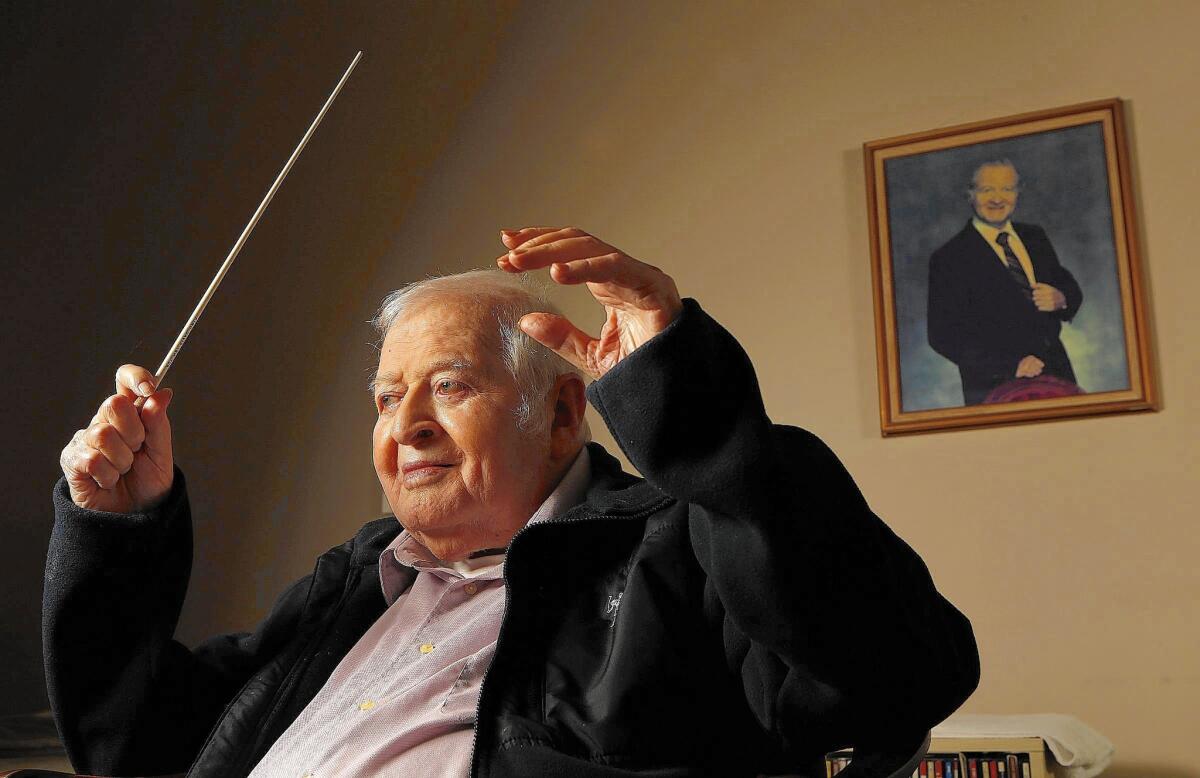After 63 years, beloved maestro is passing the baton at Brentwood-Westwood Symphony Orchestra

The radio as I drive is tuned to KUSC, so I can enter his world even before I arrive.
The music of the masters softens Los Angeles, bringing order to chaos. Lampposts are treble clefs; birds sit on power lines like the notes of an unfinished symphony.
I park on 17th Street in Santa Monica and push through the lobby of the assisted living center. I stroll the length of a long hall.
The last door on the left bears a gold nameplate.
“Maestro.”
I knock, and the maestro is in.
“It is a pleasure to meet you,” he says.
The pleasure is mine.
Alvin Mills is 94. Two conductor’s batons rest on the tray of his walker, within arm’s reach. He might drop or misplace one — you never know — and it’s good to have a backup.
Mills has a round, kind face, with patient eyes. Teach music to public school children for 30 years, and patience finds a way into your being.
That job, performed primarily in Glendale schools, was not Mills’ only contribution to the world of music in Los Angeles. The other began the year Dwight Eisenhower took up residence in the White House.
Mills wanted to start a community orchestra. He and a musician friend, Robert Turner, settled on the Westside.
And so began the Brentwood Symphony Orchestra, which soon became the Brentwood-Westwood Symphony Orchestra.
The United States has had 10 presidents since 1953.
The orchestra has had but one conductor in its entire 63-year existence.
May 15 will be that conductor’s final concert.
“I’ll be very sorry it’s over,” Maestro Mills tells me. “It’s as simple as that.”
Health is an issue now for the man who had three wives and has five children, nine grandchildren and two great-grandchildren.
He has conducted from a sitting position in recent years, and he’s shared more duties with associate conductor Diego Miralles, to whom he will pass the baton.
Music was a matter of destiny for Mills, who grew up west of downtown L.A. with a father who was a drummer and a mother who was a pianist. He played a pretty good violin, but at 13, he attended his first concert — at the old Philharmonic Auditorium on Pershing Square in downtown Los Angeles — and it wasn’t a violinist who caught his eye.
It was Pierre Monteux, the conductor of the San Francisco Symphony Orchestra.
“A new idea became open to me,” Mills says, eyes shining, as if it were last week. “I didn’t realize somebody could stand up there with a hundred musicians and do such marvelous things.”
Mills went home and dashed off a letter to Monteux, who promptly replied on Hollywood Hotel letterhead. The typewritten note was dated Dec. 11, 1935.
“I am sure, loving music like you do, that you will be a very good conductor one day,” wrote Monteux.
Mills studied music at USC, and as a violinist, he played with Leopold Stokowski and the Hollywood Bowl Symphony Orchestra. But he set down his violin when he got a chance to study conducting with the man who had been his inspiration.
Under Monteux, he learned how to draw out the warmth of his musicians, to unite them in a shared mission, and to use humor when things did not go well.
Mills occasionally wondered in later years what it might have been like to conduct a major orchestra. But he found joy in working on a smaller stage — public school auditoriums, usually — shaping an orchestra made up of local talent.
“That might be your son or daughter in the orchestra, or your mother or father. And there’s the fact that it’s the community orchestra. It belongs to the people,” Mills says.
Concerts staged by the nonprofit, which relies on donations, have always been free, and over the years, Mills brought his orchestra to audiences on the Westside and beyond.
He also held an annual youth competition, with winning musicians landing scholarships and seats in the BWSO orchestra alongside adult professionals.
“He’s been a father-type person to me,” says flautist David Shostac, 74, who first performed in Mills’ orchestra at 13 and is now about to retire from the L.A. Chamber Orchestra.
In 1992, Shostac and other musicians came to Mills’ defense during a coup attempt. The musicians marched outside the home of an orchestra board member who thought it was time to dump the aging founder and bring in fresh leadership.
“The reason I play with the Brentwood-Westwood Symphony is out of love and respect for Alvin,” Shostac told a Times reporter back then.
Mills and his loyal supporters prevailed, several board members resigned, and the band played on.
Not that it’s easy to keep a community orchestra alive. Janise White, director of the Afro-American Chamber Music Society, tells me each month is a challenge, even after 28 years of commitment. And I know of youth orchestras that struggle to survive.
“I feel that in the world today, classical music is dying unless people fight for it,” says Bob Engelman, the current BWSO board chair. His father served in the same role for decades and helped Mills keep the nonprofit alive.
Mills, he says, has been loved by his musicians and audiences.
“He’s kind of spiritual,” says Engelman, “and he believes that if you do good things and create good energy and good music, everything will work out. It’s worked out pretty well for him.”
Mills’ last concert will be at University Synagogue in Brentwood, and details are available at BWSO.org.
He still has some prep work to do, the maestro tells me as we sit together, his cat Harley at our feet.
Mills asks about the musician friend I’ve written about. I tell him that when I hear Tchaikovsky’s Serenade for Strings, I think of my friend practicing that piece when he was a student at Juilliard, looking through the windows of his New York City apartment at falling snow.
I play Serenade on my phone and Mills swoons.
He tells me Brahms is probably his favorite composer, and we watch Leonard Bernstein conduct his First Symphony.
Maestro Mills holds one of his batons. A smile takes form. He raises the baton, as he has a million times, and says:
“It’s like a magic wand.”
Twitter: @LATstevelopez
See more of our top stories on Facebook >>
ALSO
A Santa Barbara ‘safe parking’ program for homeless people may be coming to L.A.
Seven Muslim women sue Laguna Beach cafe for discrimination after they were ordered to leave
California voters getting chance to fully legalize marijuana
More to Read
Sign up for Essential California
The most important California stories and recommendations in your inbox every morning.
You may occasionally receive promotional content from the Los Angeles Times.











